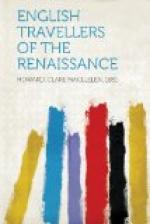The martial type which France evolved dazzled other nations, and it is not surprising that under the Stuarts, who had inherited French ways, the English Court was particularly open to French ideals. Our directions for travellers reflect the change from the typical Elizabethan courtier, “somewhat solemn, coy, big and dangerous of look,” to the easy manners of the cavalier. A Method for Travell, written while Elizabeth was still on the throne, extols Italian conduct. “I would rather,” it says of the traveller, “he should come home Italianate than Frenchified: I speake of both in the better sense: for the French is stirring, bold, respectless, inconstant, suddaine: the Italian stayed, demure, respective, grave, advised."[215] But Instructions for Forreine Travell in 1642 urges one to imitate the French. “For the Gentry of France have a kind of loose, becoming boldness, and forward vivacity in their manners."[216]
The first writer of advice to travellers who assumes that French accomplishments are to be a large part of the traveller’s education, is Sir Robert Dallington, whom we have already quoted. His View of France[217] to which the Method for Travel is prefixed, deserves a reprint, for both that and his Survey of Tuscany,[218] though built on the regular model of the Elizabethan traveller’s “Relation,” being a conscientious account of the chief geographical, economic, architectural, and social features of the country traversed, are more artistic than the usual formal reports. Dallington wrote these Views in 1598, a little before the generation which modelled itself on the French gallants, and his remarks on Frenchmen may well have served as a warning to courtiers not to imitate the foibles, along with the admirable qualities, of their compeers across the Channel. For instance, he is outraged by the effusiveness of the “violent, busy-headed and impatient Frenchman,” who “showeth his lightness and inconstancie ... in nothing more than in his familiaritie, with whom a stranger cannot so soone be off his horse, but he will be acquainted: nor so soone in his Chamber, but the other like an Ape will bee on his shoulder: and as suddenly and without cause ye shall love him also. A childish humour, to be wonne with as little as an Apple and lost with lesse than a Nut."[219] The King of France himself is censured for his geniality. Dallington deems Henry of Navarre “more affable and familiar than fits the Majesty of a great King.” He might have found in current gossip worse lapses than the two he quotes to show Henry’s lack of formality, but it is part of Dallington’s worth that he writes of things at first-hand, and gives us only what he himself saw; how at Orleans, when the Italian commedians were to play before him, the king himself, “came whiffling with a small wand to scowre the coast, and make place for the rascall Players,... a thing, me thought, most derogatory to the Majesty of a King of France.”




